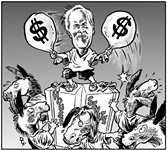Picking Up the CHIPs
Clarendon scandal opens a window on the joys of privatization
By Michael King, Fri., July 16, 2004
Well, it turns out that how insurance works depends on whether or not you're an insurance company. According to the audit issued last week of the state's contractual relationship with the New York-based Clarendon National Insurance Co. – responsible since 2000 for managing the CHIP program in 170 rural counties – the Health and Human Services Commission "paid Clarendon some $14.4 million in insurance-related fees" over a two-year period, even though the HHSC was self-insuring the program against medical claims, and therefore "Clarendon bore little or no risk." It appears that Clarendon wasn't paying even $15 a year for that $14.4 million in free money, but maybe the Lege can send them a bill.
Of course, somebody at Clarendon needed to "administer" that $14.4 million (probably needed a roomful of BlackBerries just to count it), so the commission threw in another $5.3 million in "administrative fees" over roughly the same period, to keep track of money Clarendon wasn't supposed to get in the first place. Right there you've got the "approximately $20 million in unnecessary or excessive payments" that has been the headline number over the last several days, but the state audit – describing HHSC's lax management as "an abuse of ... fiduciary responsibility" – doesn't quite stop there. Clarendon apparently paid its program manager "$5.5 million in excessive fees" although "the program manager had no employees and did not provide a service ... that directly benefited CHIP."
There's more: $15.96 million in CHIP funds "inappropriately" directed to Clarendon corporate use; $835,000 in overcharges that the commission noted but paid anyway; $1.79 million spent for unnecessary "reinsurance" ... and so on. Some of these problems overlap, but all in all, the auditors found that the commission had taken care of the state's money about as well as William Bennett on a Vegas bender.
Finger-Pointing Time
Clarendon, about to lose its contract (or worse), has gone mute. Commissioner Albert Hawkins says the agency has learned its lesson, adopted new procedures, and will have all of CHIP audited this fall. He may not get to wait that long. The legislators who requested the Clarendon audit (among them Austin Sen. Gonzalo Barrientos and Round Rock Rep. Mike Krusee) are demanding explanations, more hearings are on the way, and on Monday Granny Strayhorn entered the fray, requesting formal investigations by the U.S. Attorney's Office and the U.S. Department of Health and Human Services (the feds match state CHIP dollars three to one, so they should be very interested in Clarendon's books).
The comptroller said she is "shocked and appalled" at the auditor's findings and suggested that the mismanagement was possibly "criminal." Strayhorn also took predictable but intriguing swipes at Gov. Perry, saying current and former members of his staff have held unseemly close relationships with CHIP subcontractors. The word "incestuous" slithered in the air.
Perry's office fired back, calling Strayhorn's statements "a desperate attempt to divert attention from the ongoing investigation into Comptroller Strayhorn's tax decisions and her campaign contributions not to mention her own recommendation to cut CHIP funding by $231 million." Indeed, during the big 2003 budget bust, Strayhorn took aim at CHIP and Medicaid, but of late, smelling a wedge issue against the Republican right, she has become those programs' loudest GOP champion.
The Way Things Work
The HHSC is understandably getting hammered by the auditors and the legislators and the newspapers, and it seems reasonable to suggest they should have taken better care of public monies intended for children's health care. But that's only if one assumes that the purpose of government programs like CHIP is the general public welfare. Rather, under the new dispensation of privatization, the state simply functions as a way station between the taxpayers' money and the enrichment of private players like Clarendon and its subcontractors, such as program manager Michael Masters and his wife Rhonda. As all the employees of "Community Health Systems," Michael and Rhonda took a $1.50 monthly taste for every child enrolled in CHIP in 170 counties, thereby raking in $200,000 a month for more than two years. Then they branched out, formed another company, and (barring further federal curiosity) are busy selling their "expertise" to other states in need of extractive services. (Much of the story was first reported by Dave Mann in the Sept. 26, 2003, Texas Observer.)
Asked in a deposition what he did for the money, the best explanation Michael Masters could come up with was "herding cats." At $200,000 a month for cat-herding – more than Albert Hawkins earns in a year for running the entire HHSC – Michael and Rhonda make Siegfried and Roy look like small-timers.
What's the privatizers' answer to this latest Texas demonstration of the folly of jobbing out public responsibilities to hustlers whose only motive is private profit? More of the same, of course. Tsk-ed Brooke Rollins of the Texas Public Policy Foundation, "This is precisely why the calls to simply throw more money at government programs flunks the commonsense-test. ... Solutions such as deregulating health insurance, thus making it more affordable for employers to offer to employees, [are] the real answer to our uninsured crisis in Texas."
Perhaps you thought Michael Masters, the beneficiary of all that thrown money, was not a "government program" but an "entrepreneur," and that the state's handling of Clarendon and its subcontractors provides a vivid example of "Deregulation Gone Wild!" Like those thousands of Texas families trying to choose which bills to pay this month, it's obvious you just don't understand how insurance works.
Got something to say on the subject? Send a letter to the editor.










